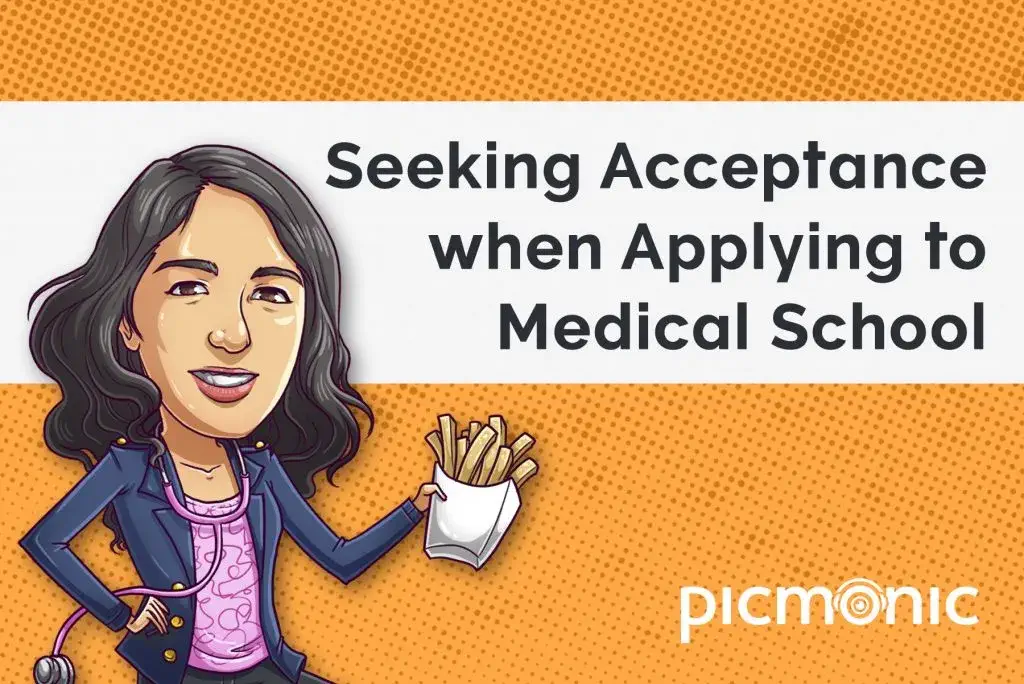As any medical school applicant knows, the MCAT is only the first step in a very long journey. Applying to medical school is dotted with various milestones that students need to reach by certain (made up but effective) deadlines. The med school application timeline is nearly set in stone. You know what I’m talking about: take the MCAT by April, submit your AMCAS in June, and finish all secondaries by the end of July. Do not let the fact that there are MCAT dates available through August and that secondaries technically aren’t due until December lull you into a false sense of security. Essentially, you’re in a race to beat over 50,000 students and get your application to the top of the admissions committee’s review pile.

When I started the process of applying to med school, I was not fully aware of these early deadlines and how dire they are. Don’t get me wrong, I knew applying early was important. What I didn’t know was that you can submit your AMCAS before you get your MCAT score back. (If you haven’t read my blog post about taking the MCAT in June after 5 weeks of studying, check it out!) I also didn’t know that it can take AMCAS 3 weeks to verify your application. So, after taking my MCAT in June, I waited to get MCAT scores back in July before writing my primary (in a few days) and submitting it in the beginning of August. (I guess you can say…I did apply “late”.)
I’m sure you’re cringing (I always cringe when I think about how late I was too). But don’t worry, this story has a happy ending (because I did get interviews and was accepted to more than one school). So for any of you who are applying this cycle, early or “late”, I’ll give you the inside scoop on how the process went for me. This way, you’ll be exponentially more prepared than I was!
Tackling Secondary Applications

Aim to get your secondaries in during the summer (and as early as you can). If you’re a college student, chances are you’ll have relatively more free time during your summer vacation than in the fall. And if you’re gap yearing (like I did), lots of your internships and activities will pick up pace by August. I speak from experience because, unfortunately, I wasn’t verified by AMCAS until the end of August (3 weeks after I submitted my primary). At that point my time was largely devoured by my involvement in 3 different projects, so I didn’t submit my final secondary until the end of September.
Like the typical medical student, I applied to quite a few medical schools. Needless, to say, I then had quite a few secondary applications to fill out. It can be hard to tailor yourself to 10+ different places (especially if, like me, you haven’t heard of some of them until this process). It’s pretty tedious, but I’ve learned that each medical school’s website becomes your best friend; so definitely take the time (or 10 minutes) to explore what each school has to offer.
STAY ORGANIZED

I also recommend staying very organized with your secondary applications; it will make your life much easier in the long run. I ended up making a folder on my computer and saving each school’s secondary in it’s own word document. This will make your life easier in many ways:
- Some secondaries will ask you the same question, so you can use what you’ve already written in more than one application.
- Even if the same questions aren’t asked in more than one secondary (which is the usually the case) you can still reuse bits and pieces of what you’ve already written. That sentence of linguistic genius you came up with while on a sugar rush at 2 am? Definitely show that to as many schools as you can.
- Remember: schools invite you for interviews in part based on what you write in your secondary. So once interviews start rolling in, make sure to review the secondary you wrote for the school you’re interviewing at. It will help orient you towards the school culture and also remind you what made you stand out. Which brings me to…
Interview Season
The medical school interview time frame varies a lot by school- some schools may give you an answer in October, while some might not have a decision for you until April. I received a total of 3 interview invites when applying to medical school (which, considering I applied way later than you’re supposed to, blew my mind). When your interviews do start rolling in, you’ll either be assigned a date or get to choose your own. If you do get the option to schedule, I recommend doing it as soon as possible because dates go FAST (more about this later).
I was invited to my first interview at the end of September, to take place the following month. My second came in mid-October, which was one I had to schedule myself. I remember opening the email 5 minutes after receiving it and seeing a plethora of dates available in December. Since it was an out-of-state interview, I decided I wanted to make a trip out of it…so I waited to finalize some details before choosing a date that night. By that time, everything in December was gone and I had to schedule my interview for January (on Friday the 13th may I add). Finally, my last interview invite came within a week’s notice in early November.
At the end of it all, I had an interview in October, November, and January. This opened an entirely new facet of the medical school admissions process.
2022 / 2023 Interview season update: Some med schools are still opting to host interviews online, but most are allowing in-person and hybrid style interviews this year! Check the websites of the schools you’re applying to in order to stay as up to date as possible.
The Actual Interview
PREPARING
Whether it’s a traditional interview or an MMI, a lot of resources online say you cannot prepare for your medical school interviews. I’m telling you (from experience) that that is a complete lie; you absolutely MUST prepare if you want to succeed.
From my experience, I’ve found that the majority of med school interview questions fall into 2 categories: personal questions and scenario-based questions. Personal questions revolve around your values and personality and can usually be answered using activities listed on your AMCAS. (If you’ve ever given a job interview, then you’ll have a good idea of what to expect.) Scenario-based questions usually involve critical thinking and some sort of ethical or moral dilemma.
I cycled through a lot of different resources to prepare for each interview, and these two were the only ones that actually helped (and resulted in a quick medical school acceptance):
- How to approach any interview question
- Ethical scenarios
Definitely check them out!
2022 / 2023 Update: In 2020, the Association of American Medical Colleges (AAMC), the organization responsible for organizing the med school application process, released an official tool for holding interviews online–the AAMC VITA. However, as of April 30, 2021, the AAMC VITA is no longer active. The AAMC decided not to offer the VITA interview for the 2022 admissions cycle as med school applicants and schools indicated they preferred live interviews over pre-recorded responses.
TRADITIONAL VS. MMI
In the minds of many applicants, there seems to be a lot of doom and gloom associated with the MMI (I know I was terrified when interview #3 turned out to be one). There’s no need for that though because an MMI is pretty similar to a traditional interview, just with more interviewers. In fact, I got the same sorts of questions in both kinds of interviews!
The only thing that sets MMI’s apart is the occasional hands-on activity or role-play (you’ll most likely have both). Once again, as long as you prepare ahead of time you’ll be totally fine!
YOUR INTERVIEWER
Contrary to my (and I’m sure many of yours) expectations, medical school interviewers are VERY friendly and comforting. That in and of itself is enough to put your mind at (somewhat) ease.
Of course, there are some not-so-friendly interviewers out there, so it’s not all butterflies and rainbows (but that’s life, right?). I experienced this during my first interview, right after listening to one of my fellow students tell me his interviewer took him on a scenic walk and called him “buddy”. (A pretty stark contrast to say the least.) I spent the majority of my interview trying to get my interviewer to at least crack a smile (something I always do to ease the tension) and didn’t succeed until the very end (after I already felt like a puddle of failure). I also felt like I spent the entire interview trying to convince the interviewer that, despite being an engineer, I did indeed want to be a doctor. (I found out later that the interviewer had told a different student that she didn’t seem committed to medicine…so at least I avoided that.)
If you have an experience like this…don’t fret, you’ve probably done much better than you expect (even after what I thought was a trainwreck, I ended up getting accepted to this school in May). Also, remember that once the interview is over, it’s over! You can’t do anything to change what’s happened, so it’s better (for your mental health) to return to normal life and use what you’ve learned to do better next time.
The Aftermath of Applying to Medical School

I would say that one of the most anxiety-provoking times when applying to medical school is waiting for a response after your interview (ignorance is NOT bliss in this situation). Some schools are pretty quick to let you know their decision but others are…not.
For example, I found out 2 days after Interview #1 that I was waitlisted and 2 weeks after Interview #3 that I was accepted (February 1st will forever be my favorite day). However, interview #2 was a different story. For every month after my interview in November, I got an email letting me know that I was still being considered but was not quite accepted. In March I got a notice that I was officially waitlisted, and currently I am technically still an “alternate” (I’ll take that over a formal rejection though).
The other stressful thing is the actual day you’re supposed to hear back from your school because you don’t always know what time you should expect to hear your fate. Some schools will let you know an exact hour (4 pm for Interview #1), others will give you a rough time frame (morning time for Interview #3), and for some you’ll just have to guess (Interview #2). Depending on your school, this can leave you in a jumble of nerves and anxiety for the majority of the application cycle, which is no fun. Here are some things you can do to stay sane and prepared during this time.
KEEP BUILDING YOUR EXPERIENCES
Until I got accepted to a medical school, I treated myself as if I would be a reapplicant the following year. This doesn’t mean I believed I was a failure from the start, but it does mean I worked to build my résumé and expand my experience during the year I applied. You should NEVER become stagnant because as a med student, resident, and doctor, you will always be piled high with work and challenges; it’s a good idea to make a habit of being hardworking now! (Also, staying busy will distract you from worrying and stressing.)
PLAN AHEAD
By the time December rolled around and I still had not gotten an acceptance (only a waitlist and an interview left to do), I looked back at my medical school application to highlight what I could improve if I did reapply. For me it was my MCAT, so I started studying for it again as if I would be retaking it that following April. This gave me a sense of control over my future (which is a difficult feeling to come about when you’re waiting for people you don’t know to decide if you’re worthy of attending their institution). It also helped relieve stress because I knew that I was bettering myself in the case I would have to reapply.
Med school acceptance rates vary greatly, but are generally on the lower side- acknowledging the possibility of failure is a healthy way to prepare yourself for the future.
I think it’s always better to be safe than sorry, so start preparing for the next application cycle if you become excessively stressed out while waiting to hear back.
REMAIN POSITIVE

How you respond to events during the application cycle is totally in your control. Remember: a rejection is not the end of the world and a waitlist is a beacon of hope! Waiting for medical school interview invites can be mentally (and physically) exhausting- and no one really knows exactly when to expect interview invitations for medical school. Interview invites can pop into your inbox as late as April and you can get an acceptance as late as July! Congratulate yourself for the work you put in, not just what you’ve achieved. Think about it – to get to the point where you’re able to apply to med school (and expect reasonably good responses), you had to put in years of hard work to fulfill those formal (and informal) med school admissions requirements. Even if this cycle doesn’t go as you hoped, if you follow my advice you’ll be so prepared to reapply that success will eventually be inevitable. So remain optimistic and tell yourself “I WILL be a doctor”.
GOOD LUCK!
Keep up with Aimen’s journey as a first year medical student by following her on Instagram @lil_waimen.
Med school acceptance is tricky to navigate. To help, we’re answering your questions with the most up-to-date information for the remainder of 2022 and for 2023!
How do I guarantee my medical school acceptance?
If you’re expecting an acceptance letter to the top medical schools out there, prepare for the reality that there may not be one. The sad truth is that there is no absolute guarantee you’ll be accepted to medical school. We reccommend you apply to multiple schools, have options, and get ready to try again. There’s always room for improvement whether it be in your MCAT scores, clinical experience, resume, or interview skills. Don’t give up and keep working on your career!
How do you answer “why should we accept you into our medical school”?
This can be a tricky question and answers will vary from person-to-person. Most med schools want to know why you’d be not only a great medical professional, but a great med student as well. Now, we know not everyone who applies to med school is on a pre-med track, but most major in science and biology.
No matter your background, you want to highlight how you’ll make the best of your med school experience and healthcare career by providing examples of hands-on experience, your willingness to learn, and examples of leadership. Show, and don’t tell. Storytelling is extremely important in this scenario.
What percentage of medical school applicants get accepted?
In 2022-2023, the AAMC reports 22,712 of 55,188 medical school applicants matriculated to medical schools. This means approximately 41.15% of applicants got accepted this year which is a slight increase in comparison to 2021-2022.
What makes you stand out on a medical school application?
Medical school admissions committees seek well-rounded medical students. With the right amount of preparation, your final med school application should include research projects, extracurricular activities, volunteering, and overall experience in addition to a good GPA and MCAT score.
What should you not say in a medical school interview?
Don’t be negative in your med school interview or just repeat what’s on your application and resume. Instead, allow the interviewer to get to know you. Show your personality, be natural, and always tie your answers back to the point. Even if you talk about a failure or your weaknesses, show your interviewer how you’ve learned from it or how you plan to work on it.
How do you answer “why should we choose you for this university”?
Ah, the infamous “why you” question. Again, this is the perfect time to highlight who you are, how you thrive under pressure, why you’re passionate about your future career (like being a future MD or DO), and how you stand out amongst your peers. So, emphasize why you’re unique or different than other applicants and capitalize on it. They’re plenty of other applicants with high GPAs, high admission exam scores, and grades, but you can bring more to the table.
How hard is med school acceptance?
Med school acceptance rates are extremely competitive. The hardest medical schools to get into in the U.S. have acceptance rates of 1.1% according to the U.S. World & News Report.
What is most important for med school acceptance?
There’s not just one aspect of your med school application you should focus on. Every step in the process is important. From your resume, application, interview, letters of recommendation, MCAT scores, and tons more, you’ll have to prepare for every single one! If you’re early in your undergrad, aim for good grades and scoring internships, research experience, and leadership roles.
What makes a strong med school application?
Applying to med school is quite a lengthy process. It requires you to stay organized and keep track of important deadlines. The earlier you can get your med school application completed, the better and the stronger your chances are of scoring a med school interview invite. A strong med school application hits the nail on every element. Before you submit your application, you may want to ask a mentor to look over it to make sure you’re meeting the mark.
What is the average GPA for medical school acceptance?
According to the AAMC, the average GPA of accepted medical students for the 2022-2023 admission cycle was 3.75. This is a high, competitive GPA so if you’re not quite there yet, it’s time to put in some extra study hours. Admissions want to see an upward trend and improvement of your grades from freshman year in your undergraduate.
What is the lowest GPA a medical school will accept?
2022-2023 med school applicants with a 3.00-3.19 GPA had an 17.1% acceptance rate overall. The truth is that med schools generally don’t accept lower than a 3.00 GPA, so make sure you focus on keeping it up!
We hope this answers your questions and helps you prepare for applying to med school. If you’re early on in the process, study for the MCAT with Picmonic!













